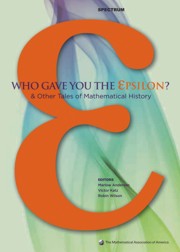Book contents
- Frontmatter
- Introduction
- Contents
- Analysis
- Geometry, Topology and Foundations
- Algebra and Number Theory
- Surveys
- Foreword
- The International Congress of Mathematicians
- A Popular Account of some New Fields of Thought in Mathematics
- A Half-century of Mathematics
- Mathematics at the Turn of the Millennium
- Afterword
- Index
- About the Editors
A Popular Account of some New Fields of Thought in Mathematics
from Surveys
- Frontmatter
- Introduction
- Contents
- Analysis
- Geometry, Topology and Foundations
- Algebra and Number Theory
- Surveys
- Foreword
- The International Congress of Mathematicians
- A Popular Account of some New Fields of Thought in Mathematics
- A Half-century of Mathematics
- Mathematics at the Turn of the Millennium
- Afterword
- Index
- About the Editors
Summary
At the beginning of the nineteenth century, elementary arithmetic was a Freshman subject in our best colleges. In 1802 the standard of admission to Harvard College was raised so as to include a knowledge of arithmetic to the ‘Rule of Three’. A boy could enter the oldest college in America prior to 1803 without a knowledge of a multiplication table ([3], p. 60). From that time on the entrance requirements in mathematics were rapidly increased, but it was not until after the founding of Johns Hopkins University that the spirit of mathematical investigation took deep root in this country.
The lectures of Sylvester and Cayley at Johns Hopkins University, the founding of the American Journal of Mathematics and the young men who received their training abroad cooperated to spread the spirit of mathematical investigation throughout our land. This has led to the formation of the American Mathematical Society eight years ago, as well as to the starting of a new research journal, The Transactions of the American Mathematical Society, at the beginning of this year. While these were some of the results of mathematical activity, they, in a still stronger sense, tend to augment this activity.
In Europe suchmen as Descartes, Newton, Leibniz, Lagrange and Euler laid the foundation for the development of mathematics in many directions. These men, as well as a few of the most prominent names in the early part of the nineteenth century, were not specialists in mathematics. They were familiar with all the fields of mathematical activity in their day and some of them were well known for their contributions in other fields of knowledge.
- Type
- Chapter
- Information
- Who Gave You the Epsilon?And Other Tales of Mathematical History, pp. 385 - 390Publisher: Mathematical Association of AmericaPrint publication year: 2009

